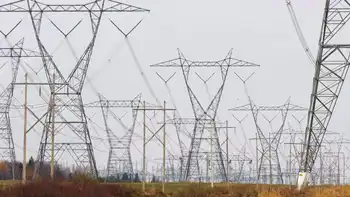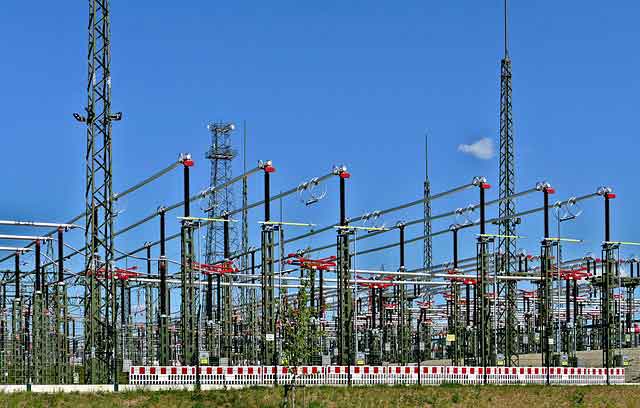Automatic standby generators selling briskly this year
By Florida Today
Protective Relay Training - Basic
Our customized live online or in‑person group training can be delivered to your staff at your location.

- Live Online
- 12 hours Instructor-led
- Group Training Available
In summer, however, the rest of the world catches up with him.
"If people see a storm anywhere, the phones start ringing off the hook," Iacobacci said. "It's become a very popular item."
Weather Engineers, which in 2005 was named top Carrier dealer out of 9,000 nationwide, is one of the local companies that has seen a steady and strong consumer interest in automatic standby generators.
"We're busy year-round, but July is our busiest month," said Wes Henderson, in charge of generator sales at Weather Engineers.
The company started selling generators three years ago.
Iacobacci initially had thought the product would primarily serve to direct additional customers to his business.
"We knew we would pick up collateral business," Iacobacci said.
Sales surpassed expectations and now account for 15 percent of the company's annual sales.
Other companies have experienced similarly strong growth.
"We're doing very well with them this year," said Joe Chida, executive vice president for Urban Electrical in Melbourne.
Like Weather Engineers, Urban Electrical has been installing standbys for three years. Standbys account for between 10 percent and 15 percent of company total sales.
"I sold eight units in the last two weeks," Chida said.
It's not surprising that vulnerable beachside dwellers want them.
But Chida also sells many units to Palm Bay residents who faced weeks without power in 2004.
"They don't want to go through that again," Chida said.
The world of generators is made up of two major types: the high-end automatic standby models; and the portable, humming little boxes that populate people's garages and backyards after a serious outage.
The portable models so popular at warehouse clubs and big-box superstores typically sell for $500.
Automatic standby generators can be 10 times as expensive, but are completely automatic. When power goes off, the generators take over.
"I tell people to sit back and count back from 10, and the power will be back on," Henderson said. "It is a completely automatic, permanent fixed item."
These generators will provide juice to all appliances - including the ever-desired air-conditioning system - for as long as the power is out.
"The small portable ones are not big enough to run an air conditioner," Iacobacci said. "They're also not made to run 24/7."
Portables typically are rated at 5,000 kilowatts, although lower-end "suitcase" types are as small as 1,000 kilowatts.
"They're made to be used while camping," Iacobacci said.
Like insurance, an automatic standby generator is something you don't think about until the need arises.
"You take it for granted until the power goes off," Henderson said.
Automatic standby generators are a relatively new product, but already prices have dropped, making them more affordable to Joe Homeowner.
Three years ago, when Iacobacci got into the standby generator business, the price range fluctuated widely.
"They were all over the place - from $6,500 to $16,000," he said.
Now, costs have standardized and, as with digital televisions, prices have gone down.
"Prices have become reasonable," Henderson said.
Weather Engineers charges about $7,000 for a turnkey installation of the natural-gas models, a little more for liquid propane.
That will buy you a 16,000-kilowatt, entry-level generator that will comfortably power up to a 2,000-square-foot home. Larger homes may require up to 35,000-kilowatt unit.
The unit could pay for itself if it saves the home from mold.
"During the 2004 hurricanes, the power to south Melbourne Beach was out for three to four weeks," Iacobacci said. "When you're pricing these units, you need to consider how much it would cost you to mitigate mold."
"It's a big market in Florida," Iacobacci said. "It's incredible the number of generators sold in Florida. Carrier has moved thousands of these generators in Florida in the past three years. In South Florida, they sell like mad."
In addition to Carrier, Generac-Guardian, Briggs & Stratton and Kohler are among the companies that manufacture standbys.
While Florida is a very strong market for generator sales, it is by no means the only one.
"They're being sold throughout the United States, anywhere where people get power interruptions because of weather or the power grid," Iacobacci said.
"The national power grid has become increasingly unreliable," Henderson said.
Automatic standby generators may be a nice luxury for most people, but they can be truly lifesavers for others.
"For some people, it's not a luxury. It's a medical necessity," Henderson said.
If an individual requires oxygen, these standby models can make the difference between life and death.
"We do a lot of units where a generator is critical to survival," Henderson said.
For Weather Engineers, the bulk of generator business is residential.
"The commercial side is lagging, and I believe they're making a mistake," Henderson said.
However, commercial installations, like the one Weather Engineers did for Sunshine Health Foods in Titusville, are starting to catch up.
"The owner there has a lot of people dependent on her food," Henderson said. "It's commendable that she had this type of foresight."
Linda Garrison, owner of Sunshine Health Foods, recently bought not one, but two, standby automatic generators from Weather Engineers.
One went to her Sunshine Health Foods shop in Titusville, the other to her home.
Garrison's customers, many of whom have allergies, depend on her for special foods.
"I cater to a unique group of people," Garrison said. "I have walk-in coolers and freezers, so if the electricity goes off, I don't have to scramble to save the products."
Garrison figures the two units will pay for themselves after two active hurricane seasons.
But, for Garrison, there's more to these generators than financial savings.
"What nobody factors in is peace of mind," she said. "I'm hooked up. I don't have to worry. It's really about peace of mind - about being proactive, rather than reactive."
Although they carry relatively big price tags, these units can save businesses a lot of money.
According to Carrier statistics, being without power would cost a typical restaurant $700 an hour in lost revenue. Pharmacies lose $1,400 and supermarkets $3,510 an hour whenever the power goes off for extended periods.
"The generators can pay for themselves in hours," Henderson said.
Hospitals, of course, are required to have standby power, as are certain gas stations that are located along hurricane evacuation routes.
Major competition for companies like Weather Engineers and Urban Electrical lies in the Internet and from big-box home-improvement centers.
Some homeowners purchase the generators through the Internet with the thought that they can either install them themselves or act as contractor for the project.
Unlike the plug-and-go portables, however, the standbys are not easy to set up.
"It actually frightens me that people are buying these things from the Internet or from big-box stores, and trying to install them themselves," Henderson said.
The project requires a site and engineering plan, a concrete pad and electrical connection and fuel hookup, either through natural gas or by the addition of a propane tank buried in the yard.
"It's not something you want to do yourself," Henderson said. "There are certain inherent dangers in installing them if you're not qualified."
Do-it-yourself permitting also can be a headache.
"This is not an over-the-counter item," Iacobacci said.
Unlike roof or air-conditioning jobs, which require only one permit, installing a standby automatic generator necessitates multiple permitting, another headache-in-waiting for homeowners.
"Customers may not be getting enough information when they buy," said Chida, who schedules a home evaluation for any prospective standby generator customer. "You need to see what the house looks like and what the customer's expectations are."
Size matters with generators, both the unit and with the liquid-propane tanks that power some of them.
And homeowners may unwittingly purchase a generator inadequate to power their homes.
If liquid propane is used, Iacobacci recommends a 500-gallon tank.
"Some homeowners will install a 100-gallon tank," he said. "Hundred-gallon tanks are very needy, like a baby. A 500-gallon tank will give you enough fuel for 10 to 12 days. You have a bigger window to refuel."
According to Iacobacci, in the aftermath of a hurricane, liquid-propane companies typically will first service emergency facilities like hospitals, and then restaurant and other large commercial accounts, before moving down to the smaller residential contracts.
A 500-gallon tank could make the difference between cool and comfy and hot and bothered while you await a refill.
As the generators become even better and prices continue to drop, Henderson, Iacobacci and Chida expect that standby automatic generators will become part of a growing number of homes.
"The units are becoming more efficient, with a longer life of 20 years or more," Henderson said.











